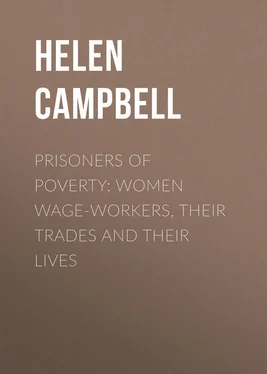Helen Campbell - Prisoners of Poverty - Women Wage-Workers, Their Trades and Their Lives
Здесь есть возможность читать онлайн «Helen Campbell - Prisoners of Poverty - Women Wage-Workers, Their Trades and Their Lives» — ознакомительный отрывок электронной книги совершенно бесплатно, а после прочтения отрывка купить полную версию. В некоторых случаях можно слушать аудио, скачать через торрент в формате fb2 и присутствует краткое содержание. ISBN: , Жанр: foreign_antique, foreign_prose, на английском языке. Описание произведения, (предисловие) а так же отзывы посетителей доступны на портале библиотеки ЛибКат.
- Название:Prisoners of Poverty: Women Wage-Workers, Their Trades and Their Lives
- Автор:
- Жанр:
- Год:неизвестен
- ISBN:http://www.gutenberg.org/ebooks/34060
- Рейтинг книги:3 / 5. Голосов: 1
-
Избранное:Добавить в избранное
- Отзывы:
-
Ваша оценка:
- 60
- 1
- 2
- 3
- 4
- 5
Prisoners of Poverty: Women Wage-Workers, Their Trades and Their Lives: краткое содержание, описание и аннотация
Предлагаем к чтению аннотацию, описание, краткое содержание или предисловие (зависит от того, что написал сам автор книги «Prisoners of Poverty: Women Wage-Workers, Their Trades and Their Lives»). Если вы не нашли необходимую информацию о книге — напишите в комментариях, мы постараемся отыскать её.
Prisoners of Poverty: Women Wage-Workers, Their Trades and Their Lives — читать онлайн ознакомительный отрывок
Ниже представлен текст книги, разбитый по страницам. Система сохранения места последней прочитанной страницы, позволяет с удобством читать онлайн бесплатно книгу «Prisoners of Poverty: Women Wage-Workers, Their Trades and Their Lives», без необходимости каждый раз заново искать на чём Вы остановились. Поставьте закладку, и сможете в любой момент перейти на страницу, на которой закончили чтение.
Интервал:
Закладка:
Employer and employed had ended in wellnigh the same words; but the gulf between no words have spanned, and it widens day by day.
CHAPTER FIFTH.
A FASHIONABLE DRESSMAKER
“Come now, be reasonable, won’t you? You’ve got to move on, you know, and why don’t you do it?”
“I’m that reasonable that a bench of judges couldn’t be more so; and I’ll not move on for anything less than dynamite, and I ain’t sure I would for that. It’s only a choice between starvation and going into the next world in little bits, and I don’t suppose it makes much difference which way it’s done.”
The small, pale, dogged-looking little woman who announced this conviction did not even rise from the steps where she sat looking up to the big policeman, who faced her uneasily, half turning as if he would escape the consequences of rash action if he knew how. Nothing could be more mysterious. For it was within sight of Broadway, on one of the best-known side streets near Union Square, where business signs were few and of the most decorous order, and where before one door, bearing the name of one of the best-known fashionable dressmakers, a line of carriages stood each day during the busy season. A name hardly less known was on the door-plate of the great house before which she sat, and which still bore every mark of prosperous ownership, while from one of the windows looked the elaborately dressed head of Madame herself, the anxiety in her eyes contradicting the scornful smile on her thin lips. The door just beyond No. – opened, and a stout gentleman descended one step and stood eying the policeman belligerently. That official looked up the street as if wishing for cry of “murder” or “stop thief” around the corner, but hearing neither, concentrated again on the antagonist whose irregular methods defied precedent and gave him a painful sense of insecurity. If two could listen, why not three? – and I paused near the steps, eyed considerately by the stout gentleman, who was evidently on the outlook for allies. A look of intelligence passed between Madame and the policeman, and her head disappeared from the window, a blind on the second story moving slightly and announcing a moment later that she had taken a less conspicuous post of observation.
“Move on now, I tell you!” began the policeman again, but paused, for as he spoke a slender, bright-eyed girl came swiftly toward them, and paused on the first step with a glance of curiosity at the little group.
“Have you come to answer Madame M – ’s advertisement?” the little woman said, as she rose from the steps and laid her hand detainingly on the hurrying figure.
“Yes,” the girl answered hesitatingly, pulling away from the hand that held.
“Then, unless you’ve got anything else to do and like to give your time and strength for naught, keep away. You’ll get no wages, no matter what’s promised. I’ve been there six months, kept on by fair promises, and I know. I’ll let no girl go in there without warning.”
“It’s a good-looking place,” the girl said doubtfully.
“It’s a den of thieves all the same. If you don’t believe me, come down to the Woman’s Protective Union on Clinton Place, and you’ll see my case on the book there, and judgment against this woman, that’s no more mercy than a Hottentot and lies that smoothly that she’d humbug an angel of light. Ah! that’s good!” she added, for the girl had shaken off her hand and sped away as swiftly as she had come. “That’s seven since yesterday, and I wish it were seven hundred. It’s time somebody turned watchdog.”
“That ain’t your business. That’s a matter for the law,” said the big policeman, who had glanced anxiously up to the second-story window and then looked reassured and serene, as the stout gentleman made a significant movement, which indicated that bribery was as possible for one sex as for the other. “The law’ll straighten out anything that you’ve a mind to have it.”
“The law! Lord help them that think the law is going to see them through,” the small woman said, with a fierceness that made the big policeman start and lay his hand on his club. “What’s the law worth when it can’t give to you one dollar of two hundred and eight that’s owed; and she that earned them gasping her life out with consumption? If it was my account alone do you suppose I’d care? Mine’s eighty-five, and I went to law for it, to find she’d as long a head as she has smooth tongue, and had fixed things so that there wasn’t a stick of furniture nor a dollar of property that could be levied on. If she’d been a man the new law that gives a cheating employer fifteen days’ imprisonment might have worked with her as it’s worked with many a rascal that never knew he could be brought up with a round turn. But she’s a woman and she slides through, and a judgment against her isn’t worth the paper it’s written on. So as I can’t take it out in money I take it out in being even with her. There are the papers that show I don’t lie, and here I sit the time I’ve fixed to sit, and if she gets the three new hands she’s after, it won’t be because I haven’t done what came to me to do to hinder it.”
The policeman had moved away before the words ended, the stout gentleman having descended the steps for a moment, and stood in a position which rendered his little transaction feasible and almost invisible. He beckoned to me as the small woman sat down again on the steps, and I followed him into the vestibule.
“You’re interested, my dear madam,” he said. “You’re interested, and you ought to be. I’ve stayed home from business to make sure she wasn’t interfered with, and I’d do it again with the greatest pleasure. I’d like to post one like her before every establishment in New York where cheating goes on, and I’m going to see this thing through!”
There was no time for questions. My appointment must be kept, and with one pause to take the name and number of the small Nemesis I went my way. Three days later she sat there still, and on the following one, as the warm spring rain fell steadily, she kept her post, sheathed in a rubber cloak, and protected by an umbrella which, from its size and quality, I felt must be the stout gentleman’s. With Saturday night her self-imposed siege ended, and she marched away, leaving the enemy badly discomfited and much more disposed to consider the rights of the individual, if not of the worker in general. As Madame’s prices were never less than fifty dollars for the making of a suit, ranging from this to a hundred or more, and as her three children were still small and her husband an undiscoverable factor, it became an interesting question to know where she placed the profits which, even when lessened by non-paying customers, could never be anything but great. Madame, however, had been too keen even for the sharp-witted lawyer of the Protective Union, whose utmost efforts only disclosed the fact that she was the probable backer of a manufacturer whose factory and farm were on Long Island, and whose business capacity had till within a few years never insured him more than a bare living.
It is an old story, yet an always new one, and in this case Madame had quieted her conscience by providing a comfortable lunch for the workers and allowing them more space than is generally the portion in a busy establishment. Well housed and well fed through the day and paid at intervals enough to meet the demands of rent or board bill, it was easy to satisfy her hands by the promise of full and speedy settlement, and when this failed, to tell a pitiful tale of unpaid bills and conscienceless customers, who could not be forced. When these resources were exhausted discharge solved any further difficulties, and a new set came in, to undergo the same experience. In an establishment where honesty has any place, the wages are rather beyond the average, skirt-hands receiving from seven to nine dollars a week and waist-hands from ten to fifteen. In the case of stores this latter class make from eighteen to forty dollars per week, and often accumulate enough capital to start in business for themselves. But a skirt-hand like Mary M – seldom passes on to anything higher, and counts herself well paid if her week of sixty hours brings her nine dollars, not daring to grumble seriously if it falls to seven or even six. On the east side the same work must be done for from four to six dollars a week, the latter sum being considered high pay. But the work is an advance upon factory work and has a better sound, the dressmaker’s assistant looking down upon the factory hand or even the seamstress as of an inferior order.
Читать дальшеИнтервал:
Закладка:
Похожие книги на «Prisoners of Poverty: Women Wage-Workers, Their Trades and Their Lives»
Представляем Вашему вниманию похожие книги на «Prisoners of Poverty: Women Wage-Workers, Their Trades and Their Lives» списком для выбора. Мы отобрали схожую по названию и смыслу литературу в надежде предоставить читателям больше вариантов отыскать новые, интересные, ещё непрочитанные произведения.
Обсуждение, отзывы о книге «Prisoners of Poverty: Women Wage-Workers, Their Trades and Their Lives» и просто собственные мнения читателей. Оставьте ваши комментарии, напишите, что Вы думаете о произведении, его смысле или главных героях. Укажите что конкретно понравилось, а что нет, и почему Вы так считаете.












